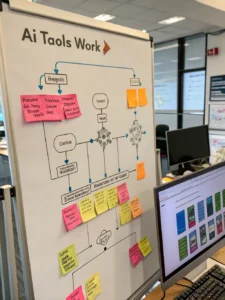What It Takes to Succeed as a Tech Entrepreneur
Is the Future Built on Innovation or Resilience? Navigating the Complex World of Tech Entrepreneurship
The tech landscape is a whirlwind of disruption, innovation, and constant evolution. But amidst the buzzwords and groundbreaking technologies, a fundamental question lingers: will the future be defined solely by audacious innovation, or will resilience and adaptability be the true cornerstones of success? In today’s dynamic environment, understanding the intricacies of Tech Entrepreneurship isn’t just about launching a product; it’s about building a sustainable venture that thrives in a world of rapid change. This exploration delves deep into the strategies, challenges, and opportunities that define this exciting and demanding field, with insights into securing Startup Funding along the way.
Key Concepts & Trends

The current wave of technological advancement is fueled by several key concepts. Artificial Intelligence (AI) is no longer a futuristic fantasy but a practical tool being integrated across industries. Generative AI, exemplified by tools like ChatGPT and DALL-E, is revolutionizing content creation, customer service, and even software development, lowering the barrier to entry for new ventures. Beyond AI, the Metaverse, while still evolving, promises new avenues for engagement and commerce. Blockchain technology’s applications extend far beyond cryptocurrencies, encompassing supply chain management, digital identity, and secure data storage.
Consider the rise of no-code/low-code platforms. These tools empower individuals with limited coding experience to build functional applications and websites, democratizing software development and fostering a surge in citizen developers. This is analogous to the shift from needing specialized manufacturing skills to utilizing 3D printing for prototyping – it makes innovation more accessible. Furthermore, the focus on sustainability and ethical tech is gaining traction, with consumers and investors increasingly prioritizing companies with strong ESG (Environmental, Social, and Governance) practices.
Data & Market Insights
The global venture capital market saw a significant rebound in 2023, with over $68 billion invested in early-stage startups, according to a report by PitchBook. While this is a decrease from the peak in 2021, it still represents a substantial amount of capital flowing into new ventures. The largest sectors attracting investment include software, healthcare, and fintech.
[Insert a visually appealing infographic here showcasing the top investment sectors in 2023, sourced from a reputable source like Crunchbase or CB Insights.]
According to a recent survey by Statista, the global AI market is projected to reach $1.8 trillion by 2030, highlighting the immense potential within this space. The proliferation of 5G and the increasing adoption of cloud computing are also key drivers, enabling faster data processing and more scalable applications. These trends indicate a market ripe for disruption and innovation, but also increased competition.
Smarter Strategies & Alternatives
Simply having a brilliant idea isn’t enough. Successful Tech Entrepreneurship demands a strategic approach. Instead of solely relying on traditional venture capital, entrepreneurs are increasingly exploring alternative Startup Funding options such as crowdfunding platforms (like Kickstarter and Indiegogo), angel investors, and government grants. Bootstrapping – funding a business through personal savings and revenue – remains a powerful strategy for maintaining control and validating market demand.
A smart move is to leverage lean startup methodologies. This involves building a Minimum Viable Product (MVP), gathering user feedback, and iterating quickly. Instead of investing heavily in a fully-fledged product upfront, test your assumptions and adapt to market needs. Furthermore, exploring decentralized autonomous organizations (DAOs) as a governance model can offer transparency and community involvement, especially relevant in the web3 space. However, always balance innovation with financial prudence; avoid chasing hype cycles and prioritize sustainable business models.
Use Cases & Applications
The impact of technology is being felt across all sectors. In healthcare, AI is being used for drug discovery, personalized medicine, and robotic surgery, leading to more efficient and effective treatments. Financial institutions are leveraging blockchain for secure and transparent transactions, while retailers are using AI-powered chatbots to enhance customer service. The rise of the Internet of Things (IoT) is connecting devices and generating vast amounts of data, enabling businesses to optimize operations and create new revenue streams.
Consider the example of startups using AI to personalize education, tailoring learning experiences to individual student needs. Or companies leveraging the metaverse to create immersive training simulations for employees. These applications demonstrate the transformative potential of technology when coupled with innovative business models. Insights from thought leaders like Elon Musk (Tesla, SpaceX) and Satya Nadella (Microsoft) highlight the importance of visionary leadership and a customer-centric approach.
Common Mistakes to Avoid
One of the most frequent pitfalls for aspiring tech entrepreneurs is building a solution in search of a problem. Thorough market research and validation are crucial before investing significant time and resources. Another common mistake is failing to build a strong team with complementary skills. A diverse team with expertise in technology, business development, and marketing is essential for success.
Data shows that a lack of market fit is a primary reason for startup failure, with over 40% of startups failing due to this issue. Furthermore, many entrepreneurs underestimate the importance of cybersecurity. Data breaches can be devastating, leading to financial losses and reputational damage. Investing in robust security measures from the outset is non-negotiable. Another often overlooked area is regulatory compliance, particularly in industries like fintech and healthcare. Failure to comply with regulations can result in hefty fines and legal repercussions.
Maintenance, Security & Long-Term Planning
Sustainable success in Tech Entrepreneurship requires a long-term perspective. Regular maintenance and updates are vital to ensure the continued functionality and security of technology solutions. Implementing a robust cybersecurity strategy, including regular vulnerability assessments and penetration testing, is paramount.
Portfolio diversification is essential for managing risk, particularly for crypto investments. Don’t put all your eggs in one basket. Regularly review and adapt your business plan to respond to evolving market conditions and technological advancements. Scalability should be a core consideration from the outset, ensuring that your technology infrastructure can handle future growth. Staying abreast of regulatory changes and adapting your business model accordingly is also crucial for long-term viability.
Summary & Key Takeaways
Navigating the world of Tech Entrepreneurship requires a blend of visionary thinking, strategic planning, and relentless execution. The future isn’t solely about groundbreaking innovation; it’s about building resilient businesses that can adapt to constant change. Embrace emerging technologies like AI and blockchain, but always prioritize market validation, team building, and cybersecurity. Don’t be afraid to explore alternative funding options and iterate quickly based on user feedback.
Ready to dive deeper into the world of tech startups? Share your thoughts in the comments below! What are the biggest challenges you see facing tech entrepreneurs today? Also, explore our resources on Tech Entrepreneurship for more in-depth articles, tools, and insights.
FAQs
Is it too late to invest in crypto?
The crypto market is highly volatile. While the 2021 boom has cooled down, many experts believe that blockchain technology has long-term potential. Investing in crypto involves significant risk and requires careful research. Focus on projects with strong fundamentals and real-world utility.
How can small businesses use AI?
Small businesses can leverage AI for tasks like customer service (chatbots), marketing automation (personalized email campaigns), data analysis (customer insights), and operational efficiency (predictive maintenance). There are numerous affordable AI tools available that require no coding experience.
What tech stacks scale best?
Tech stacks that utilize cloud-based infrastructure (AWS, Azure, Google Cloud) with microservices architecture and containerization (Docker, Kubernetes) are generally the most scalable. These technologies allow for independent scaling of different components of the application, ensuring optimal performance under load.
Share this content:














Post Comment